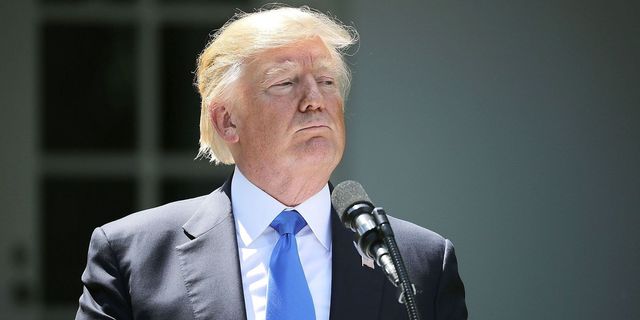Stephen Colbert alluded to it at the Tonys. Maxine Waters led a chant in support of it at a march over the weekend. Impeachment: The word has been floating around but how real is the possibility of it happening to Donald Trump?
Fans of Auntie Maxine know she's long called for Trump's impeachment, but as vocal as she's been about her issues with Trump, Waters hasn't taken the step of drafting an article of impeachment in the House, which would technically get the impeachment ball rolling.
On June 12, someone else did. Roll Call reported that Rep. Adam Sherman of California drafted an article of impeachment against Donald Trump. Sherman's colleague Al Green was the first Democrat to call for Trump's impeachment on the House floor and he also plans to introduce an article of impeachment, according to CNN.
Now that things we've reached this point, let's talk about impeachment.
How Does Impeachment Work?
Impeachment is the political process by which a president is charged with committing a crime and removed from office. The Constitution states that a president can be impeached for "treason, bribery, or other high crimes and misdemeanors." Only the House of Representatives can impeach a president, and only the Senate can convict a president of impeachment — the former cannot remove the president from office, but the latter can.
Once an article of impeachment is introduced in the House and gets to the House floor, the House votes on it and a majority vote determines whether the president is impeached or not. (In the history of the United States, two presidents have been impeached: Andrew Johnson and Bill Clinton.)
After a president is impeached in the House, it goes to trial in the Senate. The president gets a defense team while the House makes its case for impeachment. The 100 members of the Senate act as a jury, and the Chief Justice of the Supreme Court presides over the trial. A two-thirds majority, or 67 senators, is needed to convict and remove the president from office. If you're interested in more specifics on the process, Lawfare goes into a lot of detail in its impeachment primer.
What Is Considered an Impeachable Offense?
Since treason and bribery are pretty specific, the debate over what else can be considered grounds for impeachment centers on "high crimes and misdemeanors." The term is flexible on purpose but that also leads people to argue endlessly over what it really means.
As far as what we're dealing with when it comes to Trump: Elected officials and pundits have repeatedly said that obstruction of justice would be grounds for impeachment. As part of his investigation into Russia's possible collusion with the Trump campaign during the 2016 presidential election, special counsel Robert Mueller may be looking into whether Trump obstructed justice by asking former FBI director James Comey to shut down the investigation of former national security adviser Michael Flynn. (Trump is now reportedly considering firing Mueller.)
Legal scholars have said that Trump was in violation of the emoluments clause the moment he took office, which some have argued would also be grounds for impeachment. The emoluments clause prohibits government officials from accepting payments or gifts from a foreign government. On Monday, the attorneys general of D.C. and Maryland sued Trump for violating the emoluments clause.
What Are the Chances That the President Will Be Impeached?
So far, it's not looking very likely, but then again, we're less than a full five months into the Trump presidency and the impeachment chorus is only getting louder (Clinton was impeached halfway through his second term). It goes back to the fact that the impeachment process is political. The GOP controls Congress. House Speaker Paul Ryan is showing no indication of backing down from his support of Trump ("He's just new to this," he said of the president after the Comey hearing), though a few Republicans have gingerly suggested that Trump is in impeachment territory.
How Likely Is It That the President Will Be Removed From Office?
Unlikely, since it has never happened in the history of the United States. Nixon left office by resigning and that was before the House voted on impeachment. But Trump's popular support is diminishing daily; a Gallup poll from June 11 shows an all-time high disapproval rating of 59 percent. If things stay this way, and enough solid evidence against Trump emerges, Congress may be more inclined to impeach and subsequently convict Trump.













